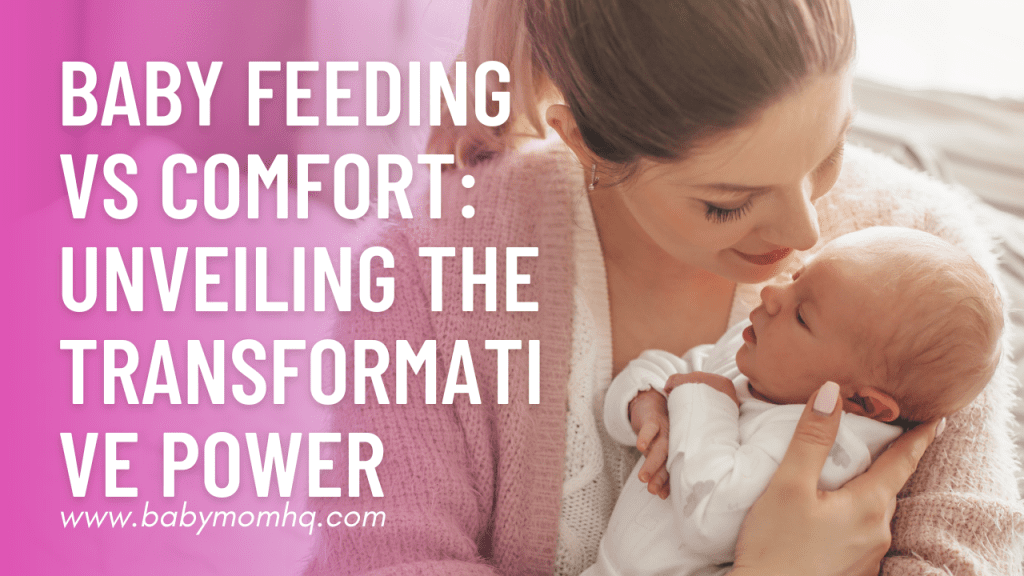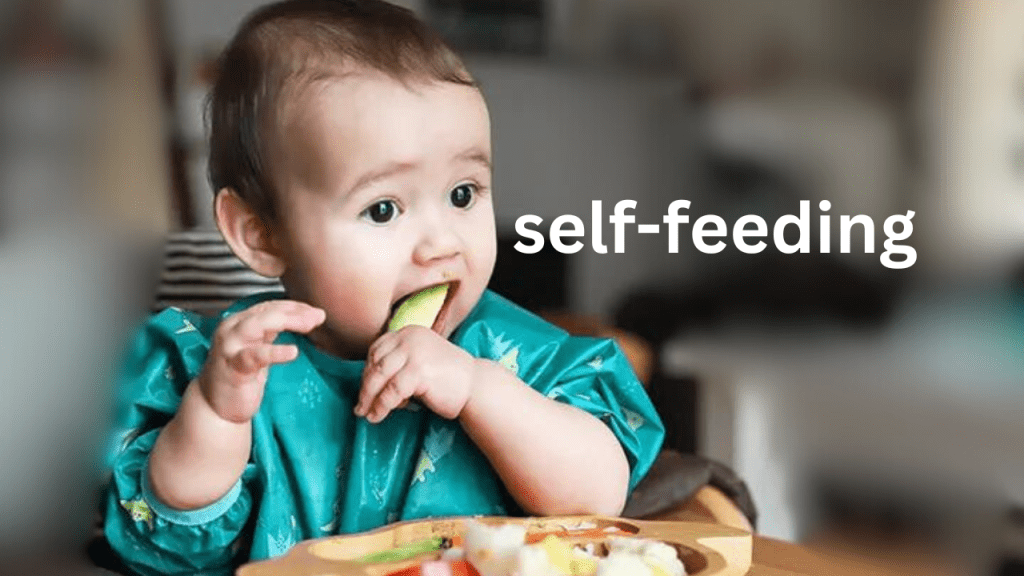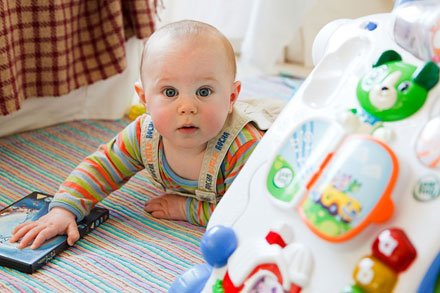Baby feeding and comfort are two essential aspects of caring for a baby, with feeding providing nourishment and comfort meeting emotional needs. Introducing solid foods to a baby’s diet is crucial for their growth and development, as it provides essential nutrients that breast milk or formula alone may not offer.
It’s important to ensure that babies receive a balanced diet with the right combination of proteins, carbohydrates, and fats. On the other hand, comforting a baby involves meeting their emotional needs through physical touch, soothing sounds, and gentle rocking. Comforting techniques such as swaddling, pacifiers, and cuddling can help babies feel safe and secure.
Combining feeding and comfort creates a nurturing environment for babies, promoting their overall well-being and fostering a strong parent-child bond.
Baby Feeding Vs Comfort, Which is Better?
The Role Of Baby Feeding
Breastfeeding provides numerous benefits for both the baby and the mother. It helps strengthen the baby’s immune system and lowers the risk of infections. Additionally, breastfeeding promotes bonding between the mother and the baby. On the other hand, bottle feeding offers convenience and allows other family members to participate in feeding.
However, it lacks the natural components found in breast milk and may require more time for preparation and cleaning. During the early stages of a baby’s development, proper nutrition is crucial. Breast milk contains all the essential nutrients required for a baby’s growth and development.
For mothers who cannot breastfeed, formula milk is a good alternative as it is designed to provide the necessary nutrients for a baby’s well-being. Meeting the nutritional needs of babies is vital for their overall health and development.
The Power Of Comfort
Understanding the baby’s need for comfort is crucial for their bonding and emotional development. Babies rely on a variety of ways to seek comfort, such as being held, rocked, or using a pacifier. These forms of comfort not only provide physical reassurance but also create a sense of security and love.
Bonding with caregivers during feeding sessions is equally important as it fosters a strong connection between them. It allows the baby to associate feeding time with comfort, resulting in a positive emotional experience. Creating a calm and nurturing environment during feedings can significantly enhance the baby’s overall well-being.
So, whether it’s breastfeeding or bottle-feeding, prioritizing comfort alongside nutrition is essential for a happy and healthy baby.
Unveiling The Transformative Power
Feeding and comfort are intertwined in a powerful way, shaping a baby’s sense of security. Meeting their physiological needs through feeding instills a feeling of safety and reassurance. This connection goes beyond fulfilling hunger; it directly impacts a baby’s overall development and well-being.
When babies are nourished and content, they can focus on growth and exploration, building the foundation for a healthy body and mind. Feeling comforted during feeding also promotes emotional bonding between the baby and caregiver, creating a secure attachment that fosters positive relationships later in life.
Recognizing the transformative power of this link between feeding and comfort is essential for promoting a nurturing environment for babies. By prioritizing both their feeding and emotional needs, we can contribute to their overall happiness and development.

Credit: www.amazon.com
Creating A Nurturing Environment
Building trust and attachment through feeding is essential in creating a nurturing environment for babies. Establishing routines for comfort and nourishment plays a crucial role in this process. By providing a calm and relaxing feeding environment, parents can encourage a sense of security and promote healthy bonding with their little ones.
It is important to be present and responsive during feedings, as this helps develop a strong emotional connection between parent and child. Offering a soothing atmosphere and a gentle, loving touch can further enhance the experience. Ultimately, creating a nurturing environment during feeding time ensures that the baby feels safe, loved, and fully nourished.
Emotional Benefits
Feeding your baby is not just about providing nutrition; it plays a crucial role in their emotional development. By responding to your baby’s feeding cues promptly, you promote emotional regulation and self-soothing. This, in turn, contributes to their sleep patterns and relaxation.
As babies associate feeding with comfort and security, it strengthens the bond between parent and child. Meeting your baby’s emotional needs through feeding establishes a sense of trust and fosters a deep connection. It is essential to prioritize your baby’s emotional well-being alongside their physical nourishment.
So, when feeding your little one, remember that it goes beyond simply satisfying their hunger; it also nurtures their emotional growth. Maintaining this understanding will contribute positively to your baby’s overall development in the long run.
Physical Benefits
Physical Benefits: The impact of comfort on digestion and nutrient absorption is crucial for babies. Comfortable feeding positions promote healthy weight gain and growth by allowing better digestion. The bond formed during feeding benefits both baby and caregiver, ensuring a positive feeding experience.
Various feeding methods and positions should be considered to find the most comfortable option. Understanding the importance of comfort can help optimize a baby’s nutrient absorption and overall well-being. As a caregiver, it’s essential to prioritize the physical benefits of feeding to support the baby’s development.
By creating a comfortable feeding environment, babies can thrive and grow optimally.
Promoting Independence
Promoting independence in infants includes encouraging self-feeding and self-soothing skills. Gradual transitions from comfort feeding to independent eating are crucial for their development. By allowing babies to explore different tastes and textures, we support their autonomy and confidence in making feeding choices.


It’s important to provide them with age-appropriate utensils and food options to help them develop the skills necessary for self-feeding. Allowing them to self-regulate their intake helps them develop a healthy relationship with food. Furthermore, promoting self-soothing skills such as gently patting or rhythmically rocking themselves provides comfort and aids in developing emotional resilience.
Encouraging independence in feeding and soothing not only enhances their physical and emotional growth but also fosters a sense of achievement and empowerment in infants.
Overcoming Challenges
Overcoming challenges when addressing feeding difficulties and aversions is essential for parents. Strategies for handling comfort-seeking behaviors should be implemented alongside seeking professional support and guidance. It is crucial to understand that feeding and comfort are interconnected for babies. By identifying and addressing feeding difficulties, parents can ensure that their babies receive the nutrition they need while also providing comfort.
This may involve trying different feeding positions, using different bottle nipples or breast shields, and adjusting the pace of feeding. Additionally, introducing solid foods gradually and encouraging self-feeding can help overcome aversions. Seeking guidance from healthcare professionals, such as pediatricians or lactation consultants, can provide parents with valuable insights and expert advice to navigate these challenges successfully.
By taking a proactive approach, parents can support their babies’ health and well-being while promoting a positive feeding experience.
Frequently Asked Questions For Baby Feeding Vs Comfort
Is My Baby Cluster Feeding Or Comfort Nursing?
Cluster feeding is when your baby feeds multiple times close together, while comfort nursing is when they nurse to soothe themselves.
Is It Ok To Let Baby Nurse For Comfort?
Yes, it is perfectly fine to let your baby nurse for comfort.
What Age Do You Stop Comfort Feeding?
Comfort feeding typically decreases as a child grows but doesn’t have a specific age limit.
Can Cluster Feeding Be For Comfort?
Yes, cluster feeding can provide comfort for babies.
Key Takeaways: Baby Feeding Vs Comfort, Which is Better?
When it comes to baby feeding versus comfort, it is crucial to find a balance that meets both the physical and emotional needs of your little one. While proper nutrition is vital for their growth and development, it is equally important to provide them with comfort and security during feeding times.
Whether you choose to breastfeed or bottle-feed, ensuring a calm and soothing environment can help create a positive feeding experience for both you and your baby. Remember to listen to your baby’s cues and respond to their individual needs, whether it be by offering a feeding or providing comfort through other means.
Ultimately, the key is to prioritize your baby’s overall well-being and foster a nurturing connection during feeding periods. With a sensitive and responsive approach, you can establish a healthy and loving feeding routine that benefits both you and your baby in the long run.



